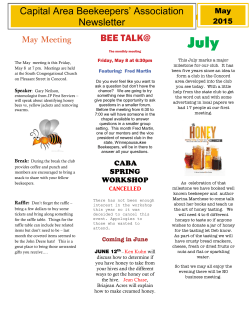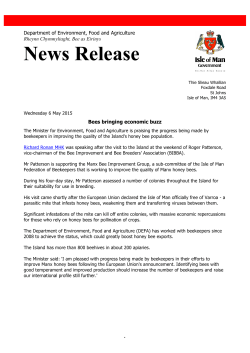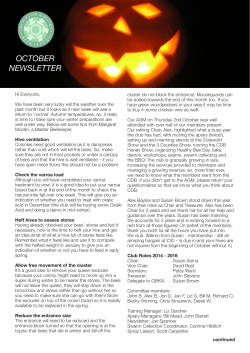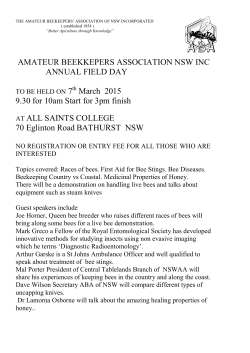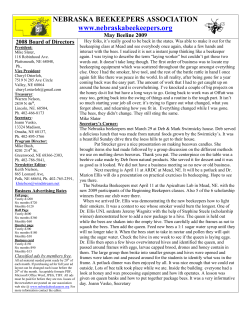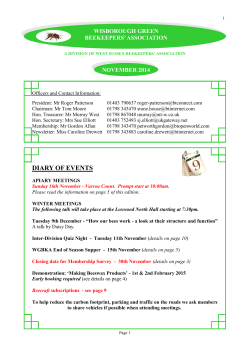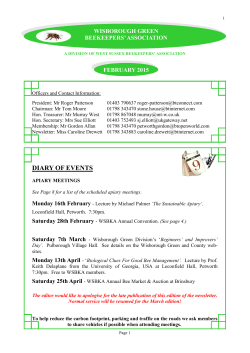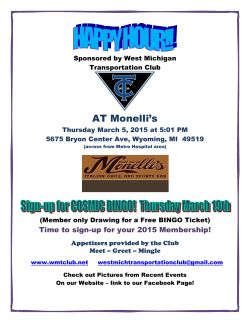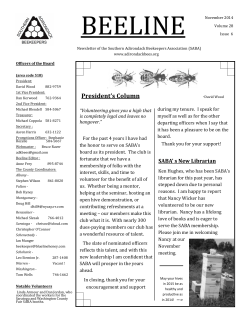
Newsletter Hive Vibe-April, 2015
Newsletter of the Appalachian Beekeepers Page | 1 Meeting the First Monday of Each Month 7 p.m. at Mountain Folk Center (formerly Industrial Park) 65 Folk Center Circle, Murphy, NC 28906 www.AppalachianBeekeepers.com Once again there is a lot going on. A few weeks ago Virginia Webb gave a presentation to the club about Apimondia (which apparently I’ve been pronouncing wrong for the last two years) and the bid by Minneapolis to host the 2019 Congress. Apparently this international meeting of beekeepers has not been held on US soil since the late 1960s – literally before man set foot on the Moon. She was asking the club for a donation towards the bid effort. We willl decide as a club at the May meeting what kind of donation we can make. Individuals may also make contributions to the effort. The May meeting is also when we will try to get the club hives truly settled in. The rain has kept us from getting their site fully cleared with plastic and mulch laid down, etc. We do still need clean wax for the club hives! A lot of the wax currently in there is very, very dark. If you have a frame of decent pulled comb to donate, the girls could sure use it. I have not heard rd any stories from club members yet about their hives swarming, but it is now the season for swarms. There are finally drones in the hives now and last week I found a fresh egg in a small, new queen cell in my strongest hive. My bet is that we will see a bunch of swarms as soon as the rain stops and the skies clear if people don’t stay on top of inspections. We will have at least one “workshop” (gathering outside of the normal club meeting) on how to split a hive and start a nuc. Details on that coming soon. Besides the rain, at least the temperatures have been very good for all of the trees in bloom so that the bees have had plenty to do between rainfalls. Seems like this has been a fantastic year for the dogwoods! Some hives are already making a small smal amount of honey (I have a double nuc which had almost finished capping a 5-frame nuc--sized super which I know was virtually empty three weeks ago). The 10-day day forecast shows overnight lows barely even dropping into the 40s. It could be a very good year for honey! Zack April 6, 2015 President Zach Stockbridge called the meeting to order at 7:00 pm. There were 32 in attendance. VOL X April 2015 No. 3 Newsletter of the Appalachian Beekeepers The Treasurer’s report was presented by Fred Bernhardt . OLD BUSINESS Page | 2 Club Dues need to be paid this month. NEW BUSINESS Introduction of our new protégé, Maddie Nolan. Maddie was provided with 2 hives and 2 packages of bees. Peter will be helping Maddie with her hives. Wayne’s Feed Store donated Maddie a Lip Balm Making Kit and has offered to sell any bee products that she makes over the next 2 years. New club hives are in place behind the Mountain Folk Center. Request was made to build hive stands. We also discussed site prep and upkeep of the grounds around the hives. GUEST SPEAKER Virginia Webb presented information on the USA bid to host the 2019 Apimondia. This is a World Congress (conference), which includes representatives from over 100 different countries who meet to discuss global beekeeping issues. The Apimondia is a 5day symposium consisting of over 600 different informational sessions,, World Honey Contest and World Honey Queen event. The U.S. group has selected Minneapolis as the proposed host site. Virginia and others are meeting with local beekeeping groups throughout the U.S. to solicit the necessary funds needed to secure conference conferen space, etc. in the event that the U.S. wins the bid. The winning country will be announced on September 20th, 2015. www.Apimondiausabidfor2019.org Donations can be made to: Apimondia USA Bid for 2019, LLC Attn:Michael North 40 South 7th Street Suite 212 #211 Minneapolis, MN 55402 General discussion topics included included: Winter Losses Wintering Bees in Container Unit: There were 6 hives placed in the unit. There was a 50% survival rate. Hives appeared weak upon removal, but they are showing signs of recovery and are now laying brood. The major issue seemed to be moisture problems. Mold was noted in some hives. Discussed when to add supers. Plans are to have a workshop on “How to do Splits” in May. VOL X April 2015 No. 3 Newsletter of the Appalachian Beekeepers Next meeting will be May 4th, 2015. PROTÉGÉ PARAGRAPH Being a beginner beekeeper is sorta scary but once you start it gets much more easy. It's fun to just sit outside and hang with the bees. I've had my bees for around 3 weeks and I already feel as if they are my family. I was very excited to get my bees but nervous to get my bees and it didn't help that the newspaper guy was there asking me questions stions and taking pictures of me. But once the bees came out I completely forgot about him. I've already named my queens after two powerful Egyptian queens, Cleopatra, and Page | Nefertiti. If it wasn't for Peter I probably would 3 have killed my bees but I think I'm I finally getting the hang of taking care of my bees. I have so much excitement in seeing my bees come in and out of their hive through out the day. Maddie DUES.....DUES.....DUES All dues were payable at the April meeting. Any dues not paid by the May meeting will result in ending membership and not receiving Club communications. The Club needs your dues to be able to continue programs such as our Protégé Program and putting beekeeping bee education in front of the public. Joyce Bernhardt Mark your calendars for the Young Harris Bee Institute, te, May 14, 15, and 16. If you don't attend the institute, you can still visit the vendors. Usually all the big ones and some different ones, like book vendors and bee jewelry, are there. disease, according to the U.S. Fish and Wildlife Service. U.S. to halt expanded use of some insecticides amid honey bee declinFriday, April 3, 2015 Reute(Reuters) – The U.S. Environmental Protection Agency (EPA) said on Thursday it was unlikely to approve new or expanded uses of certain pesticides while it evaluates the risks they may pose to honey bees. The unanimous vote on Wednesday by the Portland City Commission came despite protests from farmers, nursery owners and others who claimed the insecticide was crucial in combating pests that destroy crops and other plants. Portland is among at least eight municipalities that have banned the chemicals. The so-called called neonicotinoid pesticides are routinely ely used in agriculture and applied to plants and trees in gardens and parks. But their widespread use has come under scrutiny in recent years after a drop in the number of honey bees and other pollinating insects, which play key roles in food production. The EPA is conducting an assessment of the six types of neonicotinoids and their impact on honey bees, with its evaluation of four expected by 2018 and the remaining two a year later. The decline is attributed to factors including pesticide and herbicide use, habitat loss and VOL X The EPA notice came the day after Oregon’s largest city suspended the use of the pesticides on its property operty to protect honey bees. In the interim, the agency said in a statement that its move stemmed from the agency’s “ongoing effort to protect pollinators.” April 2015 No. 3 Newsletter of the Appalachian Beekeepers through roots and leaves, was insufficient. But the federal environmental regulators said they would review the suspension “if a significant new pest issue should hould arise that may be uniquely addressed by one of these chemicals.” “The reality lity is, there are risks to our pollinators with current uses (of the insecticide),” said Amy Code, the Xerces Society’s pesticide program coordinator. The Xerces Society for Invertebrate Conservation said the EPA’s latest measure on neonicotinoids, which are taken up by plants The EPA and a group representing farmers and other pesticide users could not immediately be reached for f comment. (Reporting by Laura Zuckerman in Salmon, Idaho; Editing by Curtis Skinner and Alan Raybould) Oxalic Acid has received EPA approval. Now that it is approved at the Federal level, each state must also approve before it can be legally distributed and sold in that state as a miticide. Formic acid for use with MiteGone Dispenser and method was registered in Canada last April. The same registration is progressing in the USA. July, 2013 EPA confirmed present status. Formic acid is an unregulated product and any beekeeper can use it in his own hives any way he wants. MiteGone Dispenser and method is legal to use in the USA. There are a number of species of varroa, all of which are native to Asia. The mite was first described by Anthonie Cornelius Oudermans in 1904 on the island of Java. Oudermans found these parasites on apis cerana and named the genus after Marcus Terentius Varro, a Roman scholar and beekeeper. Though Varro was once called “the most learned of Romans” and reportedly wrote over 600 books, now his name is mainly mentioned with distaste and sorrow when speaking of the mite. Poor guy. Later in the century, other species were discovered. The map of varroa spread can be found at http://wblomst.com/varroa A THOUGHT TO REMEMBER VOL X With bees.... Sometimes you win; sometimes you LEARN. April 2015 No. 3 Page | 4 Newsletter of the Appalachian Beekeepers Please patronize our sponsors and mention that you saw their name listed in the Hive Vibes Page | 5 Andrews Veterinary David Ackerman Hospital Candy Mountain Farm The Juhlins 135 Mi-Po Tree Service The Popes Shadow Ridge Bee Farm Harold & Becka Watkins Stockbridge Farm Jen & Zack Stockbridge Wayne’s Feed Store VOL X 1575 Main St., Andrews, NC 828/321828/321 3316 Candy Mountain 828/494828/494 Heights, Murphy, 2083 NC Murphy, NC 28906 828/644828/644 5405 Mineral Bluff, GA 706-994706 30559 4175 706-374706 0409 Andrews, NC 828/321828/321 2171 869 Andrews Rd, 828/837828/837 Murphy, NC 2139 April 2015 No. 3 Newsletter of the Appalachian Beekeepers OFFICERS President Secretary Zack Stockbridge Kay Cameron Vice President Treasurer Tom Handford Joyce Bernhardt Page | 6 If you have an interest in bees/beekeeping, we hope you will join us and enjoy meeting and talking with others who share your interest. Membership Application For Appalachian Beekeepers Date: ________________ Individual/Family-$12 Name_______________________________________________________ Address ____________________________________________________ City, State, Zip _______________________________________________ Phone________________________ Cell__________________________ E-Mail_____________________________________________________ How did your hear about our Club? ______________________________ Mail to: Joyce Bernhardt, 325 Rolling Oaks Rd., Murphy, NC 28906 RECEIPT Date_______________________ Amount $ ____________ Received from ______________________________________________ For Membership dues prorated from date above to following April 1. Signed:____________________________________________________ VOL X April 2015 No. 3
© Copyright 2025
